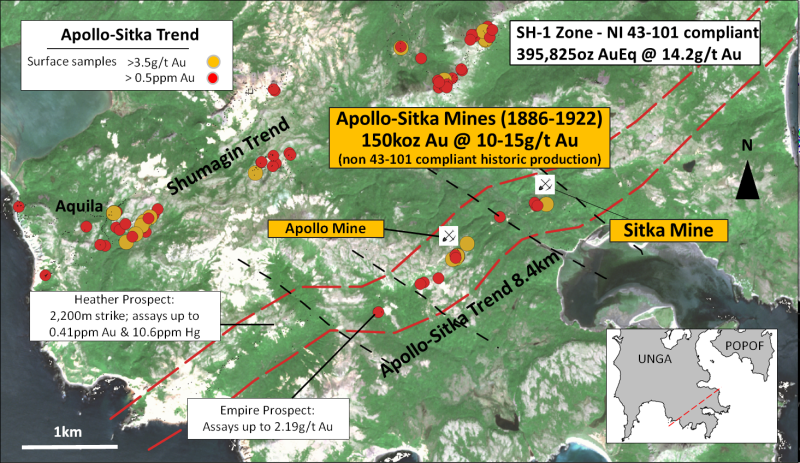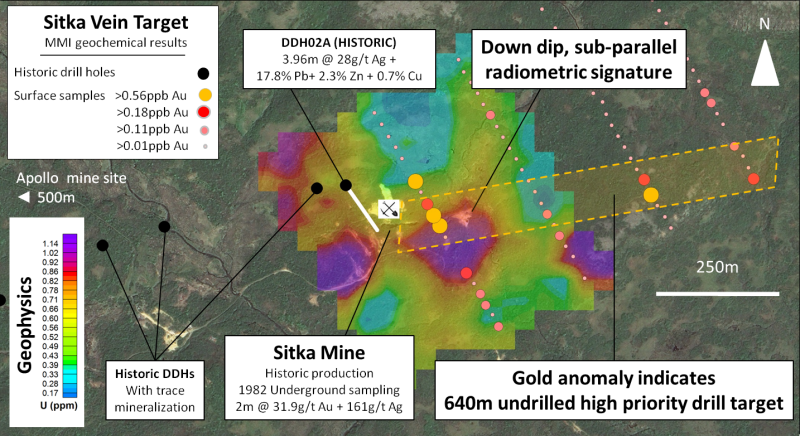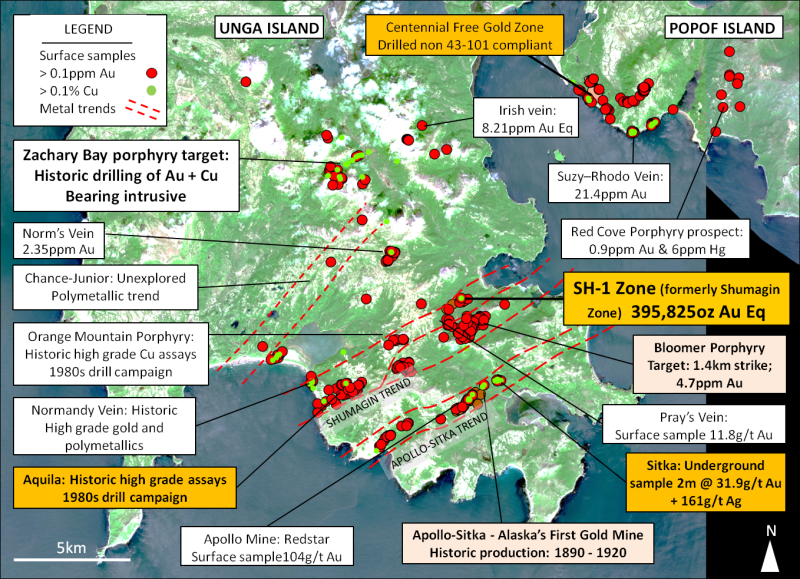Positive Exploration Results from the Historic Sitka Gold Mine at Redstar Gold's Unga Project
 | |||||||||
HIGHLIGHTS:
-
- Recent geochemical and geophysical results show potential for a new gold base metals zone
- Results indicate a significant increase in strike length of Sitka mine structure
- High probability gold and base metal, brownfields drill target indicated
- Geophysical results confirm dip direction of structure
- Sitka target represents a fourth highly prospective gold zone ready to be drilled at the Unga Project
Vancouver, Canada – TheNewswire - April 20th 2020 - Redstar Gold Corp. (TSXV:RGC), (OTC:RGCTF), (FRA:RGG) ("Redstar" or the "Company") Redstar has completed geophysical and geochemical studies over several areas of anomalous mineralization on Unga and Popof in order to determine the on-strike extent of known structures that have potential for new high grade gold zones. This release focuses on the results of an exploration program around the historic Sitka mine, discovered during mining at the nearby Apollo mine which was the first hard rock underground gold mine in Alaska operating from 1890 until the 1920s producing 150,000 ounces of gold with an estimated average grade of 10g/t to 15g/t Au1. The Sitka mine itself was reported to have produced several thousand of ounces of gold and was centred on an outcropping vein that was exploited by 240m of underground workings. Both Apollo and Sitka veins are reported to be on average 3m wide and are located on the Apollo-Sitka Trend 3.7km south of, and parallel to, the SH-1 high grade gold Zone (Redstar news release of 26th March, 2020 which reported a Maiden Resource of 395,825oz AuEq grading 14.2g/t Au on the SH-1 Zone on the Shumagin Trend).
Redstar President John Gray said the following: “These fieldwork results have revealed a 640m-long, brownfields drill target just to the east of what was a high-grade gold and base metals mine on Unga Island. As such, it represents a 500% increase in the potential strike length of the known Sitka vein which puts it in the same size range as both the original Apollo Mine located one kilometre to the west and the SH-1 Zone 3.7km to the north. Redstar intends to drill this high probability target at Sitka together with a group of other high priority zones including the recently announced targets at the Aquila Zone, the historic Centennial Zone and projected on-strike and down-dip extensions at the SH-1 Zone in order to add to the overall gold resource at the Unga Project”.
Location of the historic Sitka mine, Apollo Sitka Trend, Unga Island
(Fig.1)
Since the 1920s there has been only summary brownfields exploration to test the potential of the Sitka vein: underground sampling during a 1980’s campaign tested the upper, oxidized portion of the vein and returned grades up to 2m @ 31.9g/t Au + 161g/t Ag; a drill hole from the same campaign was collared immediately west of the Sitka mine site (DDH02A) returning assays of 3.96m @ 28g/t Ag + 17.8% Pb + 2.3% Zn + 0.7% Cu. in primary, unoxidized material at a vertical depth of 80m; but no drilling was completed east of the mine (internal report dated 1983, and Figure 1).
The fieldwork undertaken in late 2019 tested for a possible easterly, on-strike extension of the previously mined Sitka vein using ionic leach geochemical and radiometric surveys across the projected structure. The surveys were conducted on a grid of four, 500m long, 340° oriented lines spaced 200m apart that straddle the known termination of the Sitka vein as projected to surface. The geochemical survey yielded assay results containing anomalous gold assay results that trace an east-west striking structure for 640m from the known vein at the Sitka mine. The geophysical survey results locate south of this geochemical anomaly, parallel to the east-west strike, and may confirm the south dipping attitude of the buried structure. In addition, the structural study mentioned in the Redstar news release dated 13th January 2020 noted that the overall strike of the NE striking Apollo-Sitka Trend deviates southwards at the Sitka mine site towards ENE which gave rise to the dilatant flexure that was necessary to create the Sitka vein (Figure 2).
These results are highly significant as they show that the Sitka vein may extend 640m further east of the known mineralization at the historic Sitka mine which gives it a footprint equal to both the historic Apollo mine and the surface trace of the recently reported SH-1 Zone. As such it is a high probability drill target that will be tested as soon as exploration is able to recommence with the aim of defining a NI 43-101 compliant resource to add to that of the nearby SH-1 Zone on the Shumagin Trend, bolstering Redstar’s intention of creating an economically minable overall resource at the Unga Project. That this potentially high-grade structure can be traced using ionic leach and radiometric survey is also a positive development as both are relatively inexpensive exploration methods.
Potential 640m on strike extension of the Sitka vein
(Fig.2)
About Redstar Gold Corp
Redstar is a well-financed junior exploration and development company with a supportive institutional shareholder base, no debt and focused on advancing its high grade Unga Gold Project in southern Alaska. The 100% controlled Unga Gold Project includes the SH-1 Zone where, earlier this year, Red Star defined an initial NI 43-101 compliant resource of 395,825 ounces AuEq with an avg. grade of 14.2g/t Au, making it one of the highest-grade gold deposits in North America. Geologically, the SH-1 Zone is an intermediate sulfidation, epithermal gold deposit, located within a mineral district which that includes porphyry through epithermal systems containing gold, silver and base metal mineralization. The property encompasses approximately 240km2 and contains multiple gold zones drilled or identified at surface including: the high grade SH-1 Zone and the Aquila high grade gold zone, both on the Shumagin Trend; the former Apollo-Sitka mine which was Alaska’s first underground gold mine with historic production grades up to 10 g/t Au; and the Zachary Bay porphyry gold-copper mineralization, all of which are on Unga Island; and the disseminated gold mineralization at the Centennial Zone on neighbouring Popof Island (Figure 3).
The Unga Gold Project enjoys a moderate climate at latitude 55 degrees North which provides for year-round tidewater that hosts extensive infrastructure including a deep-water port with weekly vessels from Anchorage and Seattle and is served by daily flights from Anchorage landing on a mile long, paved airstrip on Popof Island. In addition to the Unga Project, Redstar has an investment in NV Gold Corp. (TSXV: NVX) and 30% of the Newman Todd Gold Project, in Red Lake, Ontario, Canada.
Gold and Base Metal Prospects on Unga Island and Neighbouring Popof Island
(Fig.3)
For additional information please contact:
John A. Gray
President
Tel: +44 747 068 6474
Email: j.gray@redstargold.com
Neither TSX Venture Exchange nor its Regulation Services Provider (as that term is defined in the policies of the TSX Venture Exchange) accepts responsibility for the adequacy or accuracy of this release.
Forward-Looking Information This release includes certain statements that may be deemed "forward-looking statements". All statements in this release, other than statements of historical facts, that address events or developments that Redstar Gold Corporation (the "Company") expects to occur, are forward-looking statements. Forward-looking statements are statements that are not historical facts and are generally, but not always, identified by the words "expects", "plans", "anticipates", "believes", "intends", "estimates", "projects", "potential" and similar expressions, or that events or conditions "will", "would", "may", "could" or "should" occur. Although the Company believes the expectations expressed in such forward-looking statements are based on reasonable assumptions, such statements are not guaranteeing of future performance and actual results may differ materially from those in the forward-looking statements. Factors that could cause the actual results to differ materially from those in forward-looking statements include market prices, exploitation and exploration successes, and continued availability of capital and financing, and general economic, market or business conditions. Investors are cautioned that any such statements are not guarantees of future performance and actual results or developments may differ materially from those projected in the forward-looking statements. Forward-looking statements are based on the beliefs, estimates and opinions of the Company's management on the date the statements are made. Except as required by applicable securities laws, the Company undertakes no obligation to update these forward-looking statements in the event that management's beliefs, estimates or opinions, or other factors, should change.
1 Gold production records for the mine were measured in dollars of sales. The average gold price from 1886 to 1922 was $20.67oz


